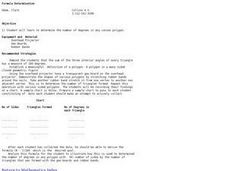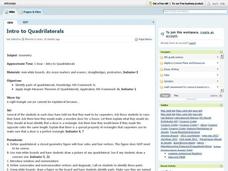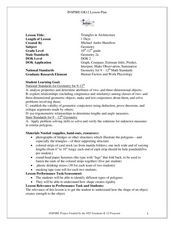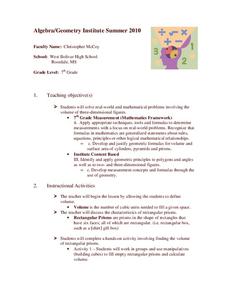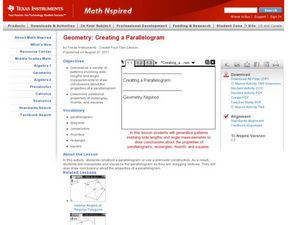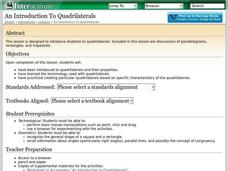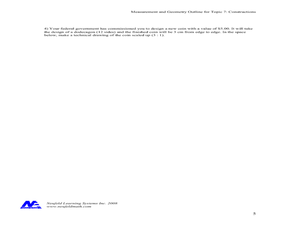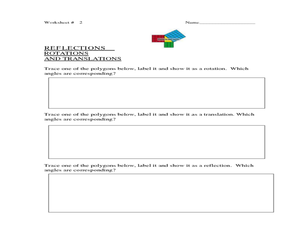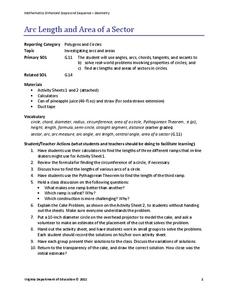Curated OER
Formula Determination
Learners derive a formula for the interior degrees in any convex polygon. In this geometric figure lesson, students determine the shapes of various polygons and the number of triangles formed. They use this information to derive the...
Curated OER
Intro To Quadrilaterals
Students engage in a lesson that is concerned with the concept of quadrilaterals and how they are used to create a rectangle for a door. They create a drawing of a quadrilateral while finding the sum of the angles. They practice problems...
Curated OER
Triangles in Architecture
Students find triangles in the real world. In this geometry lesson, students analyze and identify properties of two and three-dimensional objects. They differentiate between similarity and congruence.
Curated OER
Mathematics in Robotics
Learners build and create using math. In this geometry lesson plan, students differentiate between congruent and similarity as they observe polygons. They create robots with different functions using properties of geometry.
Curated OER
Connecting Formulas Related to Geometric Figures
Young scholars identify diagrams of quadrilaterals and circles by different names and classify the figures. They name the areas for each diagram and practice solving the formulas for each.
Curated OER
Algebra/Geometry Measurement
Fifth graders investigate units used to measure different geometric situations. In this geometry lesson plan, 5th graders measure length, mass, volume and temperature using units for measurements. They estimate the measurements before...
Curated OER
Measurements
Seventh graders solve word problems involving real world situation. In this geometry lesson, 7th graders solve problems related to volume. They apply the formulas taught in geometry.
Curated OER
Fashion Day
Eighth graders practice using basic measurements to solve word problems.They also investigate finding the perimeter of different polygons and define the characteristics to classify the shape as a polygon.
Curated OER
Quilt Squared
Students study West Virginia quilts. In this mathematics lesson plan, students use symmetry, geometric shapes, and patterns to create their own quilt square.
Curated OER
Creating Parallelogram
Learning how to define vocabulary words related to solving parallelograms will assist your learners in identifying different parallelograms. They use the navigator to view different shapes created by moving the parallelogram around.
Curated OER
An Introduction to Quadrilaterals
Students explore the concept of quadrilaterals. In this quadrilateral lesson, students play with a floor tile applet to see that there are many types and characteristics of quadrilaterals including parallelograms, trapezoids, rectangles,...
Curated OER
Investigating Area Relationships
Learners investigate the area of various figures. They construct triangles and quadrilaterals using Cabri Jr. and discuss the relationships between different angles, side lengths, and figures.
West Contra Costa Unified School District
Congruent and Similar Polygons
What's similar about congruent and similar polygons? Young mathematicians first measure the side lengths and angles of given figures. They use these measurements to determine relationships between side lengths and angles of congruent and...
Curated OER
Surface Area with Polydrons
Students explore measurements by analyzing geometric shapes. In this surface area instructional activity, students identify the terms volume, weight, perimeter and area in order to find the requested measurements of specific polygons....
Curated OER
Incredible Edible Bridges
Students create a bridge using engineering and geometric concepts. In this geometry lesson, students identify the missing measures of polygons sides and angles. They work together to solve real life situation using problem solving...
Curated OER
Constructing Geometric Shapes
In this construction geometric shapes worksheet, student use the software program for instruction then construction shapes and bisect angles for four questions.
Curated OER
Geometers Sketchpad Practice
Students create polygons using geometers sketchpad. In this geometry instructional activity, students construct the interior angles of polygons and label the different points. They estimate and measure the different parts as they draw...
Curated OER
Space Tiling with Captain Planet
Fifth graders Apply the symmetry and angle properties of polygons, using symmetry and angle properties of polygons to solve practical problems. They study tessellates and explain why a shape tessellates.
Curated OER
Investigating Scale Factors with the Geometer's Sketchpad
Students use Geometer's Sketchpad to examine the scale factor when in is applied to the length of a figure's sides. They look at how the scale factor affects the side lengths, perimeter, and area of the figure that result. They work with...
Curated OER
Point Comparisons
Young geometers investigate two-dimensional figures using coordinate grids. They identify polygons and draw examples of their reflection, rotation, and translation on a coordinate grid. And they complete a worksheet practicing examples...
Curated OER
Exploring Geometric Figures
Tenth graders explore mathematics by participating in hands-on daily activities. Learners identify a list of different shapes and classify them by shape, size, sides and vertices. They utilize tangrams and geometric pieces to gain...
Willow Tree
The Pythagorean Theorem
There isn't a more popular geometry formula than the Pythagorean Theorem! Learners understand the special side relationships in a right triangle. They use the Pythagorean Theorem to find missing sides and to solve problems. They begin...
Virginia Department of Education
Arc Length and Area of a Sector
What do skateboarding and baked goods have in common with math? You can use them to connect half-pipe ramps and cakes to arcs and sectors. Pupils compare the lengths of three different ramp options of a skate park. They calculate the...
EngageNY
Making Scale Drawings Using the Ratio Method
Is that drawn to scale? Capture the artistry of geometry using the ratio method to create dilations. Mathematicians use a center and ratio to create a scaled drawing. They then use a ruler and protractor to verify measurements.
